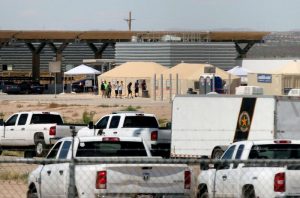With every year since 2012, there’s been a new post-second world war global record for forcibly displaced people. Last year was the worst — 68.5 million — a report by the UN High Commissioner for Refugees (UNHCR) says.
Every month since June 2015, when Donald Trump announced his US presidential bid, there has come from some part of the Western world a new dehumanising word or degrading practice or policy towards refugees and migrants.
Both trends are running together. Neediness is prompting contempt and resentment from richer countries. The migration issue is driving politics in the United States, Italy, Germany and Hungary and that’s just in the past week.
On June 20, Hungary passed legislation that criminalises lawyers and activists who help asylum seekers. On June 19, German Chancellor Angela Merkel urgently discussed the ideal but elusive common European migration policy with French President Emmanuel Macron even as her government threatened to collapse under the weight of anti-asylum forces.
On June 18, Italy’s far-right interior minister, Matteo Salvini, said a census of the marginalised Roma community would allow the rapid and wholesale deportation of “irregular foreigners… but Italian Roma, unfortunately, you have to keep at home.” In Trump’s America, the administration’s zero-tolerance policy towards migrants continued until June 21. It criminalised adult entrants along the US-Mexico border and forcibly separated migrant parents from their children.
Zero tolerance of migrants has become a moral crisis for the United States but it is providing a template for a different, darker, new American dream. This one has high walls, a locked gate and a sign that reads: “Entry by invitation only. No exceptions. Take your hard-luck stories elsewhere.” Just like the original American dream, this one travels well across borders. It can be repurposed for domestic use by xenophobic politicians anywhere.
What the no-entry signs mean for the world order is clear. The international asylum system run by the United Nations exists only in name. Once, the UN Refugee Agency was respected for its mandate to protect, assist and resettle if needed refugees, forcibly displaced communities and stateless people. Now, it is regarded as an unnecessary and troublesome entity that habitually makes unreasonable demands.
Non-European migration is generally darker-skinned and poorer. Sometimes, especially from war-torn countries such as Syria, it is Muslim. Faced with the ceaseless influx, the West increasingly feels under no obligation to share jobs, urban space and national resources with people who have no right to them by blood or culture.
In the circumstances, it matters little that the UNHCR report paints an ever more harrowing picture of growing need. Last year, says the report, the number of forcibly displaced people increased by almost 3 million to a record 68.5 million. More than half were children, many separated from their families. A massive 85% of refugees are in developing countries and 40 million of all displaced people are not able to get to an international border.
The math shows that only a small number of people make their way to the West either as refugee, asylum-seeker or economic migrant but even those tiny caravans are not acceptable and the very word “migrant” has become a term of abuse.
The language is increasingly ugly. “Illegal immigrants… will infest our country,” says Trump. “The United States,” he vows, “will not be a migrant camp.” In Italy, Salvini vows his country will not become “Europe’s refugee camp.”
Words paint a picture of what’s really happening. Migrants are being characterised as vermin, a fateful return to an earlier dark age of demonisation of the “other.” It is clear that the world’s richest, most powerful country is willing to demonise and dehumanise a whole people.
When Trump became president and accusations were levelled against his fascist tendencies, it seemed too soon to make so extreme a judgement. Eighteen months on, the Trump administration is barrelling down a well-worn route, one we have seen before with the demonisation of Jews by Nazi Germany. They were defined as the enemy, carriers of contagion, a people who would overrun Europe.
What happens next is harder to discern. The only certainty is there is no clear international obligation to provide asylum any more. In its place stands a new, dark American idea of the world that may prove to be a global nightmare.


